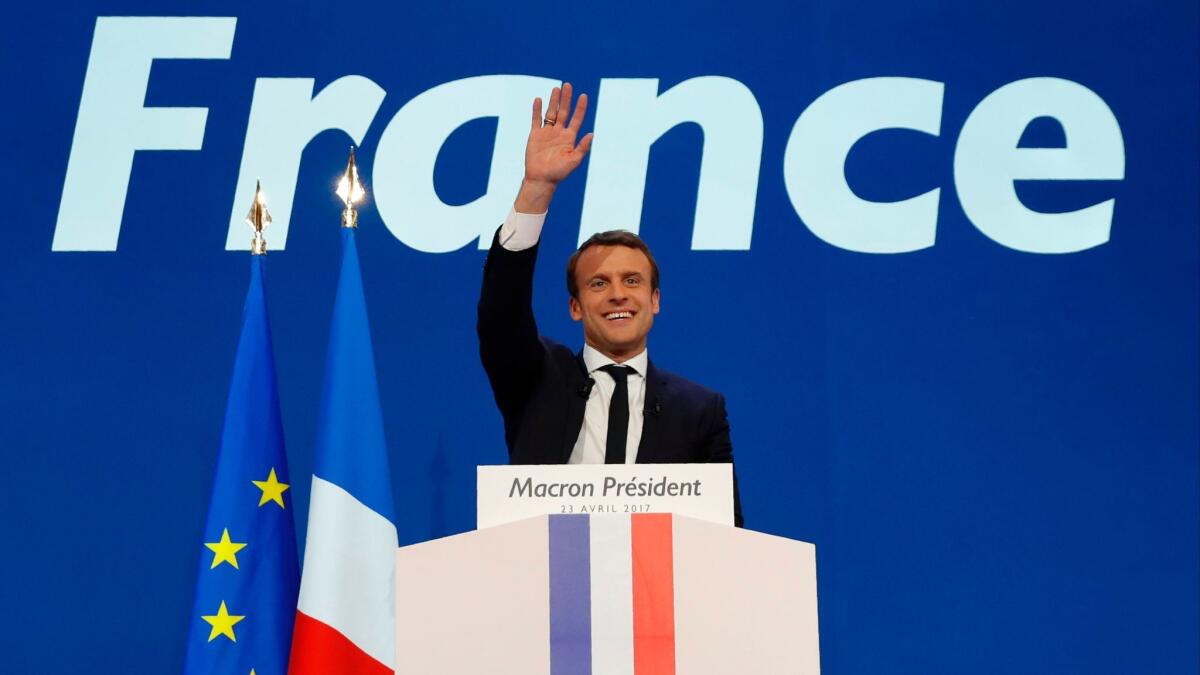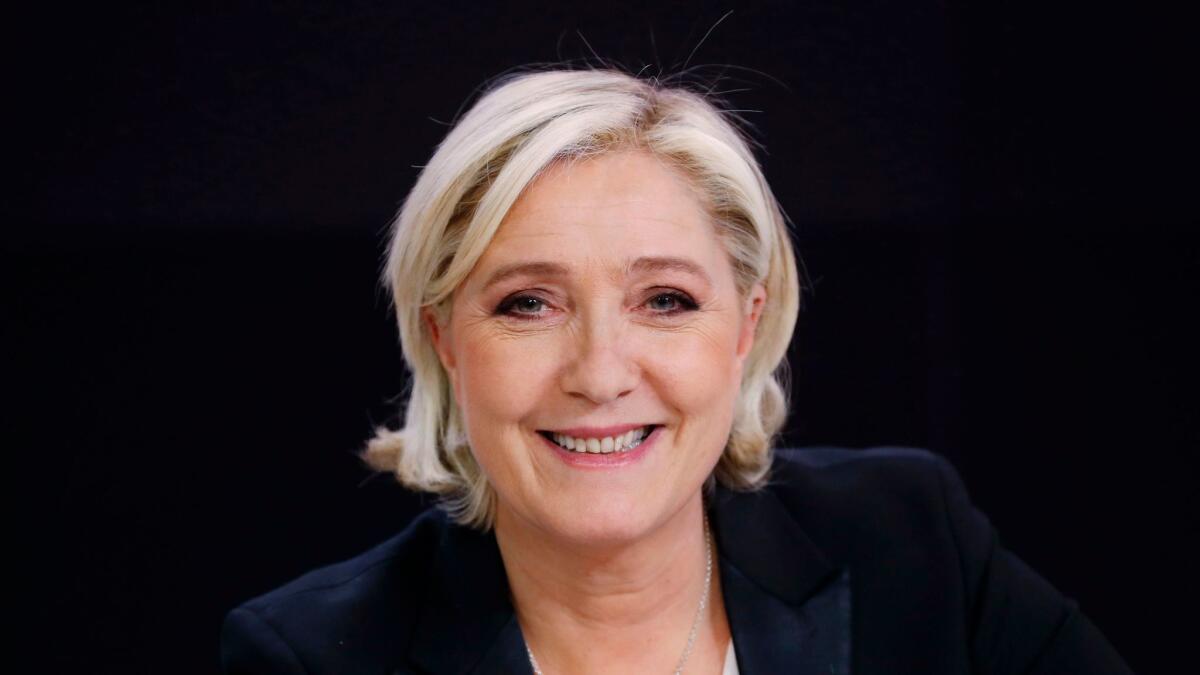Meet the man who could become France’s youngest president

- Share via
Reporting from Toulouse, France — After a year of electoral shocks around the globe, France delivered its own surprise when political neophyte and centrist Emmanuel Macron topped 10 other candidates in the first round of presidential voting.
Suddenly, an obscure former investment banker who has never been elected to political office is the heavy favorite to win a second round of voting against extreme-right candidate Marine Le Pen on May 7.
In its most important election in decades, one watched closely around the world amid a rise of nationalist and populist movements, France chose an enthusiastic supporter of the European Union, open borders and digital disruption
That Macron finds himself on the threshold of power caps a remarkable rise that has defied almost every bit of French political conventional wisdom.
He is a youthful 39 in a country where age and experience are favored; he is married to his high-school teacher, 24 years his senior; as the Socialist government’s economic minister, he pushed for workplace reforms and a renewal of entrepreneurial spirit that made him a detested figure among the country’s unions.
And breaking the ultimate French political taboo: He is not afraid to speak English in a public setting.
The result is a candidate who has confounded much of the French political establishment by building a new political movement from scratch as if he were launching a startup. His belief that there was a radical center tired of the traditional left-right choices seemed audacious a year ago, but now may be on the verge of transforming France’s politics.
“In one year we have entirely changed the political situation in France,” Macron said Sunday night to a throng of cheering supporters in Paris. “I know exactly what task lies ahead for me. This election has opened the door to optimism, to a new path for hope for Europe, and the world.”
Yet Macron, who would be France’s youngest president, continues to face skeptics who believe he is a lightweight who is merely recycling old ideas, and who may not be up to the daunting challenge ahead of pressing a reform agenda in a country that stubbornly resists change of any kind.

His opponent, Le Pen, came out swinging Sunday night, echoing many of the criticisms of Macron leveled from both the left and right: that he is banker who is a lapdog for corporations; and that he wants to put global interests ahead of France’s needs.
“At stake in this election is the savage globalization that has put our civilization in danger,” Le Pen said. “This reign, it is that of the king of money.”
While the second round of voting is two weeks away, an election night poll from Ipsos had Macron favored by 62% of the electorate over Le Pen.
France’s largest union, the CFDT, as well as the Communist Party, and the candidates from both of France’s two largest parties, the Socialist and Republican, strongly endorsed Macron and called on supporters to vote to block Le Pen.
It’s Macron’s unabashedly pro-E.U. stand that would make his victory next month resonate beyond France’s borders to those around the world looking for a globalist champion. Following his first-place finish Sunday night, Macron received congratulations from German Chancellor Angela Merkel, European Commission President Jean-Claude Juncker, and E.U. foreign policy chief Federica Mogherini following a victory speech he made from a podium standing next to a French and EU flag.
“To see the flags of France and the EU salute Emmanuel Macron’s result shows hope and the future of our generation,” Mogherini wrote in a tweet.
Macron was born in Amiens, a small town in northeast France. In high school, he met Brigitte Trogneux, his French teacher, when was 15 years old and began to woo her relentlessly. His parents, both doctors, eventually sent him to an elite private high school in Paris, but he continued to pursue Trogneux, who was married and 24 years his senior.
“At the age of 17, Emmanuel said to me, ‘Whatever you do, I will marry you!’” she told Paris Match magazine in an interview.
They married in 2007.
During the campaign, Brigitte Macron stayed close to his side, becoming one of his closest campaign advisors, and a popular figure with his supporters. In a country which has a fascination with first ladies, her age, fashion sense, and influence on Macron have made her a figure of intrigue. In an appearance in early March, he declared that she would continue to play a role as advisor if he was elected.
“She will have this role, this place, this requirement, not concealed, not behind a tweet or a hiding place, she will have it at my side,” the candidate declared, according to the LCI news service.
On Sunday, she strolled on stage with Macron, hand-in-hand, kissing briefly to cheers from the adoring crowd.
Macron, who has an undergraduate degree in philosophy and a masters in public policy, briefly worked as a bureaucrat in the Finance Ministry before quitting to join the prestigious Rothschild investment bank. It made for an unusual resume for a Socialist Party member.
In 2014, President Francois Hollande picked him to be economics minister.
From the start, Macron made it clear that he was an independent voice. He embraced reforms of France’s strict work rules while speaking glowingly of the country’s nascent startup scene. His vocal support for “La French Tech,” and his belief in the need to embrace disruption, made him sound like a Silicon Valley acolyte and won him a passionate following among entrepreneurs and the tech industry.
It also made him highly suspect among the unions that formed the traditional base of Hollande’s Socialist Party. In 2015, the government passed a series of work reforms that became known as the “Macron Law,” which triggered widespread strikes and protests.
During a now-infamous face-to-face confrontation during one protest, a striking worker said he could only dream of making enough money to afford a suit like the one Macron was wearing at the time. Macron’s response: “The best way to pay for a suit is to work.”
Behind the scenes, Macron had quietly begun working with a Paris-based political technology firm, Liegey Muller Pons, started by a handful of French entrepreneurs who had volunteered for Barack Obama’s campaign in 2008.
A year ago, Macron announced a new movement called, “En Marche!” or “Onward!” Working with the firm, he began recruiting volunteers who were willing to fan out across the country to conduct face-to-face interviews with voters. Over a three-month period, that effort, called the “Grande Marche,” saw 5,000 volunteers knock on 300,000 doors, speak to 100,000 people and fill out 25,000 questionnaires.
“If you look at Macron, he likes the American way of campaigning,” said Guillaume Liegey, a co-founder of Liegey Muller Pons. “He’s very interested in this American way of telling stories with concrete examples. Rather than the French style of just coming from the brain, he wants to talks about values and speak from the heart.”
But Macron is not afraid to use his head and heart. The data gathered by volunteers were then analyzed to understand what the electorate wanted, and how it might be addressed. Macron resigned from the government, and went on a speaking tour last summer to discuss the findings.
By late fall, those “diagnostics” and the speaking tour evolved into an official presidential campaign.
The wave swept up people like Axelle Tessandier, 36, who had left France to work at a startup in San Francisco. She returned to Paris in 2016, founding her own innovation consulting firm. She soon found herself at the center of the Macron campaign as an advisor.
Tessandier said it was Macron’s positive vision and expressions of hope, along with his political and economic openness, that convinced her he could reinvent French politics.
“I want us to be the passion vote,” she said. “I want us to be the conviction vote. I want to talk about what kind of society we want to create.”
O’Brien is a special correspondent.
ALSO
Macron and Le Pen are now in a battle for the soul of France
In surprise move, British prime minister calls for early election in bid to strengthen ‘Brexit’ plan
More to Read
Sign up for Essential California
The most important California stories and recommendations in your inbox every morning.
You may occasionally receive promotional content from the Los Angeles Times.











